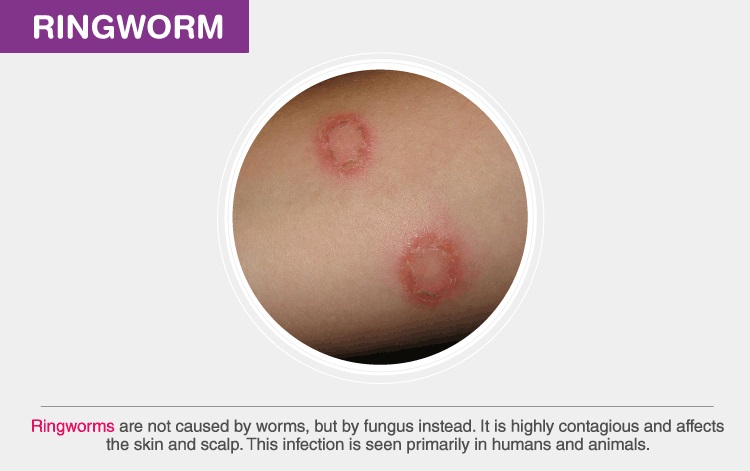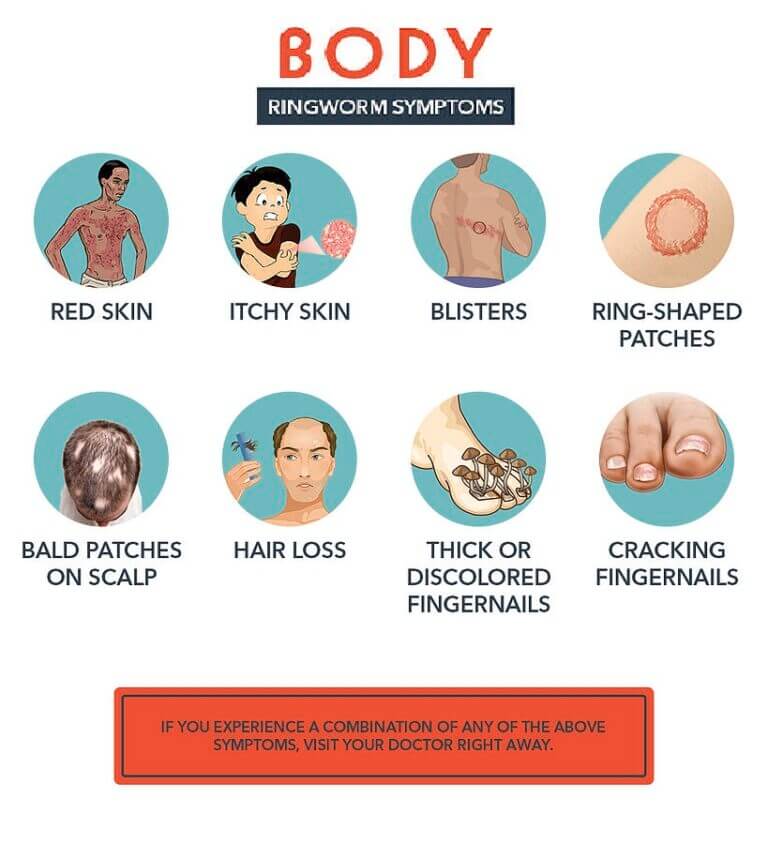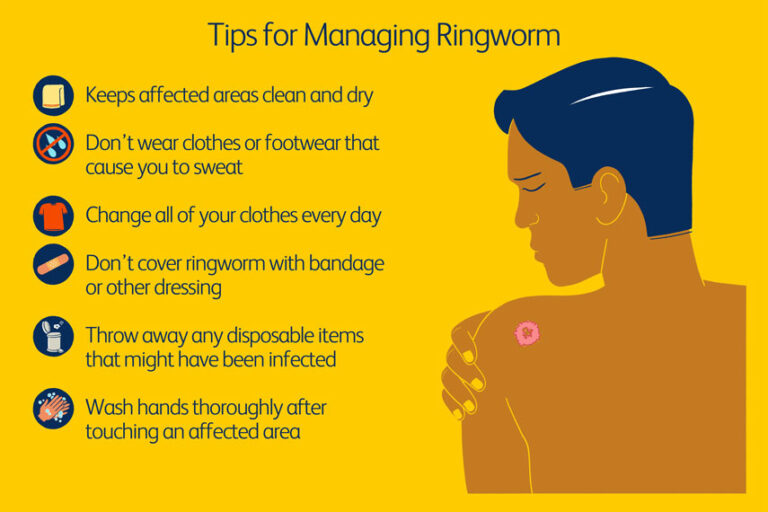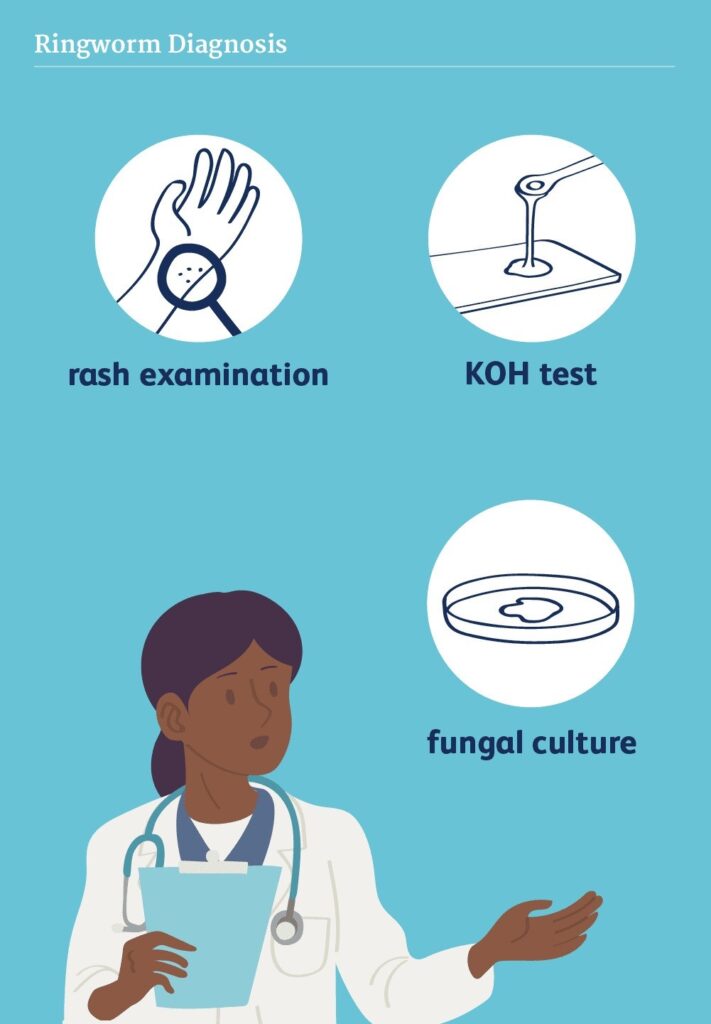RINGWORM (BODY) – SYMPTOMS, CAUSES, AND TREATMENT
The ringworm of the body (tinea corporis) is a rash caused by a fungal infection. It is generally an itchy, circular rash with clearer skin in the middle. Ringworm gets its name due to its appearance. There are not any worms involved.

Ringworm of the body is associated with athlete’s foot (tinea pedis), jock itch (tinea cruris), and ringworm of the scalp (tinea capitis). Ringworm usually spreads by direct skin-to-skin contact with an infected person or animal.
Mild ringworm usually responds to antifungal medications applied to the skin. For more severe infections, you might need to take antifungal pills for several weeks.
SYMPTOMS
Signs and symptoms of ringworm might include:
- A scaly ring-shaped area, generally on the buttocks, trunk, arms, and legs
- Itchiness
- A clear or scaly area inside the ring, possibly with a scattering of bumps whose color ranges from red on white skin to reddish, purplish, brown, or gray on black and brown skin
- Slightly raised, expanding rings
- A round, flat patch of itchy skin
- Overlapping rings

WHEN SHOULD YOU SEE A DOCTOR?
Talk to your doctor if you have a rash that does not begin to improve within two weeks of using an over-the-counter antifungal product. You might need prescription medication.
CAUSES
Ringworm is a contagious fungal infection caused by common mold-like parasites that live on the cells of the outer layer of your skin. It could be spread in the following ways:
- Human to human – Ringworm usually spreads by direct, skin-to-skin contact with an infected person.
- Animal to human – You could contract ringworm by touching an animal with ringworm. Ringworm could spread while petting or grooming dogs or cats. It is also pretty common in cows.
- Object to human – It is possible for ringworm to spread by contact with objects or surfaces that an infected person or animal has recently touched or rubbed against, like clothes, towels, bedding and linens, combs, and brushes.
- Soil to humans – In rare cases, ringworm could be spread to humans by contact with infected soil. Infection would most likely happen only from prolonged contact with highly infected soil.
RISK FACTORS
You are at higher risk of ringworm of the body if you:
- Live in a warm climate
- Have close contact with an infected human or animal
- Share clothing, bedding, or towels with a person who has a fungal infection
- Participate in sports that feature skin-to-skin contact, like wrestling
- Wear tight or restrictive clothing
- Have a weak immune system
COMPLICATIONS
A fungal infection rarely spreads below the surface of the skin to cause severe disease. But people with weak immune systems, like those with HIV/AIDS, might find it difficult to get rid of the infection.

PREVENTION
Ringworm is hard to prevent. The fungus that causes it is common, and the condition is contagious even before symptoms show up. Take these steps to lower your risk of ringworm:
- Educate yourself and others – Be aware of the risk of ringworm from infected humans or pets. Tell your children about ringworm, what to watch for and how to prevent infection.
- Keep clean – Wash your hands frequently. Keep shared areas clean, particularly in schools, child care centers, gyms, and locker rooms. If you participate in contact sports, shower immediately after practice or a match and keep your uniform and gear clean.
- Stay cool and dry – Do not wear thick clothing for long periods of time in warm, humid weather. Prevent excessive sweating.
- Avoid infected animals – The infection usually looks like a patch of skin where fur is missing. If you have pets or other animals, ask your veterinarian to examine them for ringworm.
- Do not share personal items – Do not let others use your clothes, towels, hairbrushes, sports gear, or other personal items. And do not borrow such things.
DIAGNOSIS
Your doctor may be able to diagnose ringworm simply by looking at it. Your doctor might take skin scrapings from the affected area so that they could be examined under a microscope.

TREATMENT
If over-the-counter treatments do not work, you might need prescription-strength antifungal medications — like a lotion, cream, or ointment that you apply to the affected skin. If your infection is particularly severe or extensive, your doctor may prescribe antifungal pills.
If you or anyone you know is suffering from ringworm on the body, our expert providers at Specialty Care Clinics will take care of your health and help you recover.
Call us on (469) 545-9983 to book an appointment with our specialists.
